Electrical Circuits Laboratory
In this lab students are trained to connect different types of circuits , analyze the circuits and verify various circuit theorems, transient and steady state analysis of circuits, find the circuit parameters, draw the locus diagrams etc.,
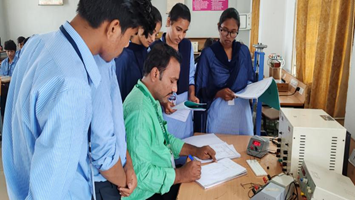
Equipments
- 5KVA voltage stabilizer
- Regulated Power supplies
- Dual Channel Cathode Ray Oscilloscopes
- Function Generators
- Digital Multi Meters
- Decade Resistance Boxes
- Decade Capacitance Boxes
- Decade Inductance Boxes
- Voltage Regulator Trainer Kit
- Fixed Voltage Power Supplies
- Electronic components
- Logic gates kit
- V – I characteristics of Zener Diode kit
- V-I characteristics of PN Junction diode kit
- half wave and full wave rectifier kit
- CE and CB configurations kit
- Implementation of half adder and full adder kit
Electrical Measurements Laboratory
For electrical engineering, a saying properly fits, “difference between exactly right and approximately right”. It firmly implicates that exact values are essential in electrical engineering therefore measurement of electrical parameters like current, voltage, power, energy, resistance, capacitance, inductance, power factor, frequency are very important for proper monitoring and controlling of systems.
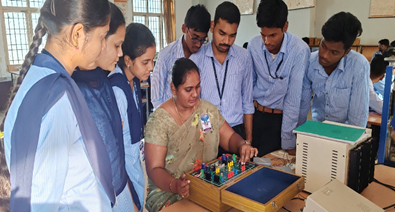
Equipments
- 5KVA voltage stabilizer
- Schearing bridge trainer kit
- Kelvin’s double bridge kit
- Crompton’s DC potentiometer
- LVDT kit
- Anderson’s bridge
- CT’S
- Single Phase Energy meter
- Single phase PF meter
- Dielectric strength of Oil Test Trainer
- Resistance strain wire gauge
Control Systems Lab
In the industrial atmosphere, the control system equipment used is a very sophisticated and costly affair, just because of the reason that the control variables are very non-linear in nature. Henceforth, there is a tremendous effort put forth by the institution to establish such equipment required for Control Systems Laboratory. The software package popularly called MATLAB which makes it easier for the students to simulate the results and study the nature of any type of system predominantly.
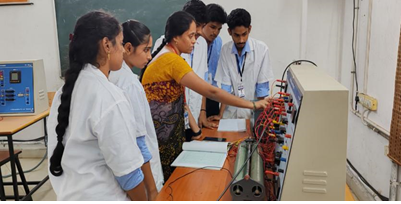
Equipments
- DC servo motor controller
- DC servo motor-2
- AC servo motor
- Magnetic Amplifies trainer kit
- Time response of second order kit
- Synchro transmitter receiver kit
- Temperature control system using PID
- PID Controller
Power Electronics Lab
Power electronics circuits can be treated as high-end electronic circuits which work more efficiently in comparison with conventional circuits. which intuitively explains that a huge amount is invested for establishment of this laboratory.
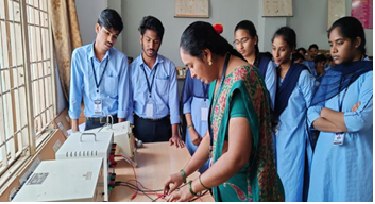
Equipments
- 3 phase full converter
- 3 phase AC voltage controller
- Single phase half controlled converter
- Single phase full controlled converter
- Three phase half controlled converter
- Single phase fully controlled bridge converter
- DC Jones chopper
- Single phase parallel Inverter
- Single phase series Inverter
- Single phase PWM Inverter
- Mc-Murray Bedford Inverter
- Single phase Cyclo converter kit
- Single phase ac voltage regulator kit
- SCR, MOSFET, BJT, IGBT characteristic kit
- R, RC, UJT firing circuit kit
- SCR forced commutation circuits kit
Electrical Machines Laboratory
This lab is well equipped with various A.C. and D.C. machines comprising different types of motors, generators, transformers in a floor area of 250 sqm. The students will have wider scope to understand the practical aspects of various motors that are used in fans, elevators, traction etc. and various generators that explain how electrical energy will be formed.
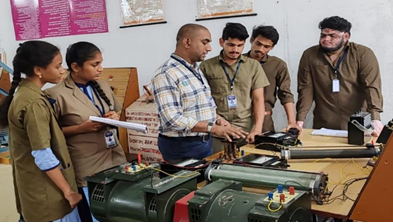
Equipments
- Rectifier unit 220V,120A
- DC Motor- Shunt Generator (DG) set-3
- DC Motor-Compound Generator (DG) set-1
- DC Motor-Series Generator (DG) set-1
- DC series Motor- Series Generator (DG) set-1
- DC shunt Motor-2
- DC compound motor-1
- 3 phase synchronous generators-3
- 3 phase synchronous motor-1
- 3 phase induction motors-2
- AC Fractional Kilowatt Motors-1
- Transformers(Scott)-2
- Transformers (2 KVA)-2
- Transformers (1.5 KVA)-2
- 3 Phase Inductive Load-1
- Lamp loads-21A-2
- VFD Drive- 1
- MG set with 3 phase IM load-1
- 1 phase IM with Capacitor bank
Simulation Laboratory
Simulation is a process of performing the real time experiments virtually on a computer. It provides tremendous exposure to the students to explore various solutions that can be obtained for a given problem, i.e., a student may have an inner fear to work with a 220 Volts DC supply or with a 230 Volts, 50Hz AC supply, upon simulating such experiments, it is pretty much easier to explore its performance characteristics the minimum wastage of power with minimum time. Various popular and effectively result oriented licensed software packages like MATLAB, P-SPICE, Multisim etc., are installed for use in this 35 desktops.
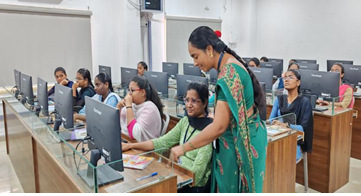
Equipments
- Dell Systems-72 No’s
- LCD Projector-1No.
Power Systems Laboratory
The power systems laboratory is responsible for teaching and researching the area of electrical power systems. Students can get concrete ideas about the different system operations and phenomena. Transmission line performance under different operating conditions; load characteristics; real and reactive power flow and control for a transmission line; characteristics of different types of relays; power system protection using relays; measurement of sequence components; balanced and unbalanced faults; power system transients and stability.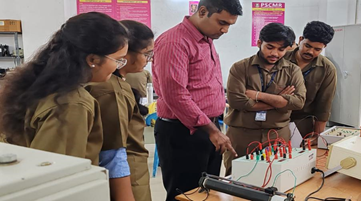
This laboratory is equipped with various relays set up on panels, representing practical on-field situations at a modular level for proper understanding of how the different protective measures work in the field, individually. Understanding these individually, the students become well equipped to analyze their working together in the field. The various practical setups that have been prepared for various topics of power system protection are as follows: Over current protection, earth fault protection, directional relay operation, reverse power protection of generator, distance protection, etc.
Equipments
- ABCD parameters trainer
- Sequence impedance measurement trainer for transformer.
- Sequence impedance measurement trainer for alternator using fault analyzer.
- Dielectric strength of Oil Test Trainer
- Tong tester
- Power angle characteristics of 3-phase alternator Trainer.
